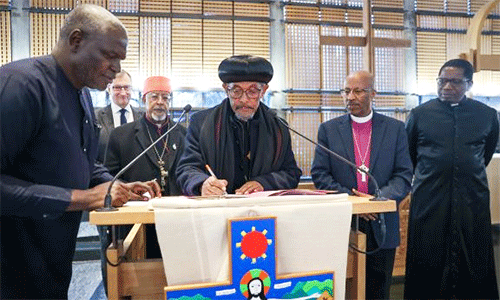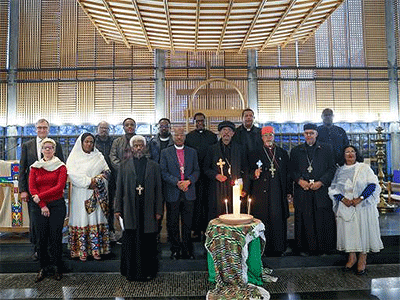High-level delegations from the three largest Ethiopian churches—the Ethiopian Orthodox Tewahedo Church, Ethiopian Evangelical Church Mekane Yesus, and Ethiopian Catholic Church—made the move with a view to strengthening ecumenical cooperation “in responding to humanitarian needs and in promoting peace and social cohesion in Ethiopia,” according to minutes released by the gathering.
The World Council of Churches (WCC) served as a convener and facilitator of the process. The meeting was supported by the German Federal Foreign Office.

The World Council of Churches is an ecumenical partner supported by the Interdenominational Cooperation Fund apportionment, which enables United Methodists to share a presence and a voice in the activities of several national and worldwide ecumenical organizations.
The Ethiopian church leaders shared extensively about the dire humanitarian situation in their nation. Currently around 20 million people require food aid, many millions are internally displaced, various parts of the country face severe droughts or floods, and recent malaria outbreaks have worsened the situation. A desire for ecumenical collaboration in advocacy for human rights was also expressed.
The minutes released by the meeting also describes the nature of the new council of churches. “The new structure that is to be created cannot be an exclusive club, as it would otherwise become an institutionalized division in the body of Christ,” reads the text. “At the same time it cannot be open to all without clear criteria and expectations.”
A task force was appointed to take the next steps.
The church delegations in the meeting were led by H.G. Archbishop Petros, general secretary of the Holy Synod of the Ethiopian Orthodox Tewahedo Church; Rev. Dr Yonas Yigezu Dibisa, president of the Evangelical Church Mekane Yesus; and H.E. Cardinal Berhaneyesus Souraphiel of the Ethiopian Catholic Church.

As the church leaders signed a resolution document showing their commitment to the new process and structure, Yonas Dr Yigezu Dibissa reflected that, for several years, these churches have been discussing how to form a new structure and reactivate the vision of ecumenical unity. He paid tribute to church leaders who, decades ago, formed partnerships and coalitions to address the needs of the people.
Peter Prove, director of the WCC Commission of the Churches on International Affairs, said the WCC was greatly honored to have such high-level representatives of these three churches. “Together they have taken some very important steps toward systemizing ecumenical cooperation in Ethiopia,” he said, noting that the new commitments also envisage reviving a previous ecumenical partnership for humanitarian response. “I think this is a historical breakthrough and a sign of their commitment to cooperate in order to meet the needs not only of the churches but of the people of Ethiopia—sending a signal to the entire population of Ethiopia about the importance of unity in confronting adversity.”
In a closing prayer at the Ecumenical Centre in Geneva, those gathered gave thanks for the gift of reconciliation and unity in Christ.
“How wonderful it is, how pleasant, to know the many efforts have been made for building peace and realizing reconciliation in Ethiopia,” they prayed together. “How wonderful it is, how pleasant, to live in a reconciled community, where repentance and forgiveness become our common language, where our neighbour’s laughter becomes our joy, and their sorrow becomes ours.”
World Council of Churches website
One of seven apportioned giving opportunities of The United Methodist Church, the Interdenominational Cooperation Fund enables United Methodists to share a presence and a voice in the activities of several national and worldwide ecumenical organizations. Please encourage your leaders and congregations to support the Interdenominational Cooperation Fund apportionment at 100 percent.





